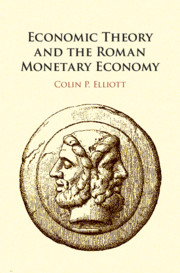Book contents
- Economic Theory and the Roman Monetary Economy
- Economic Theory and the Roman Monetary Economy
- Copyright page
- Dedication
- Contents
- List of Figures
- Preface
- Acknowledgments
- Chapter 1 On Writing Roman Economic History
- Chapter 2 Embedding Contexts of Roman Money
- Chapter 3 Evidence and Theory
- Chapter 4 Rationality, Purposefulness and Action
- Chapter 5 Money Quantity and Quality
- Chapter 6 Understanding Money Use and Value
- Conclusion
- Bibliography
- Index
Chapter 4 - Rationality, Purposefulness and Action
Published online by Cambridge University Press: 03 February 2020
- Economic Theory and the Roman Monetary Economy
- Economic Theory and the Roman Monetary Economy
- Copyright page
- Dedication
- Contents
- List of Figures
- Preface
- Acknowledgments
- Chapter 1 On Writing Roman Economic History
- Chapter 2 Embedding Contexts of Roman Money
- Chapter 3 Evidence and Theory
- Chapter 4 Rationality, Purposefulness and Action
- Chapter 5 Money Quantity and Quality
- Chapter 6 Understanding Money Use and Value
- Conclusion
- Bibliography
- Index
Summary
Some Roman economic historians are skeptical of an economic rationality which explicitly imposes capitalism-centric value judgements on antiquity. Should Roman historians study rationality as a phenomenon exclusively ‘locked’ inside the minds of individuals, or is it possible to study rationality as something at least influenced or even determined by collectivized social and cultural structures (or embedding contexts)? In this chapter, I argue that Collingwood’s observation that observers and subjects share the same cognitive process opens up new opportunities for understanding the thinking of ancient peoples. First, I define this cognitive process, after Weber and especially Mises, as ‘purposefulness’ and defend its a priori epistemological status. Then, using Weber’s insights on ideal types, I discuss how embedding contexts bounded purposefulness. Finally, I combine these arguments into an experimental heuristic model for understanding the purposeful actions of historical individuals by comparing these choices to both ideal-typical economic theory and unchosen counterfactual actions.
Keywords
- Type
- Chapter
- Information
- Economic Theory and the Roman Monetary Economy , pp. 75 - 109Publisher: Cambridge University PressPrint publication year: 2020

